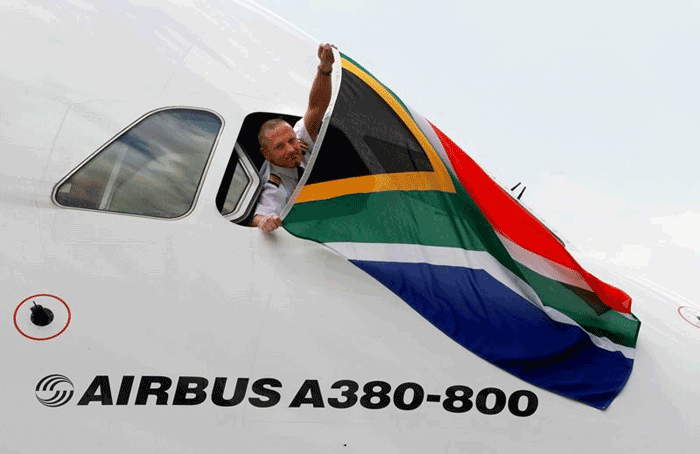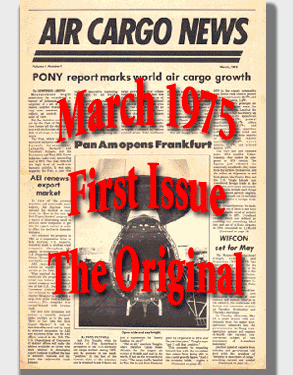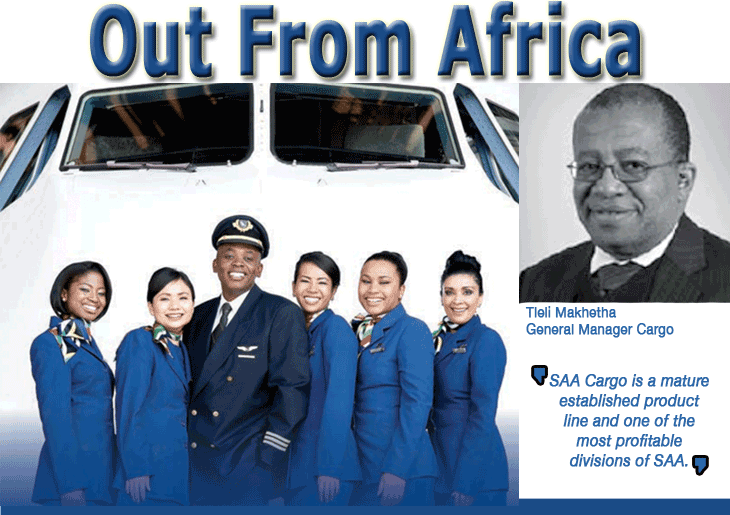
Black
History Month in the USA gets more gravitas from international
air cargo, as India-based Stat Times begins its second
go around in the booming Africa market and the transportation
trade show arena this week with Air Cargo Africa (ACA)
in Johannesburg February 20-22.
The
event is being held at The Emperors Palace Hotel, with
everything conducted under one roof.
Two
years ago, ACA premiered in Nairobi, Kenya, and drew mostly
positive reviews. It was the first time anything resembling
an air cargo trade show took place on a continent emerging
as an increasingly important market.
Networking
positives “and good for the first show” were
what we heard from ACA Nairobi two years ago.
Now
with greater attention, penetration, and competition for
what Africa has to offer air cargo, it will be interesting
to monitor results from Johannesburg this week.
It
seems to us that ACA may be thinking it is playing it
safe by going to powerful and developed Johannesburg,
the former and (according to many) future African destination.
But
by leveraging the mature Johannesburg “Hub of Africa”
address and location, ACA, which is fattening the Stat
Times coffers, must also deliver, and conferees that
are paying for booth space, hotels, airplane tickets,
journal ads, bar bills, and dinner tickets should set
the bar higher and expect solid results.
As
a trade show, ACA needs to show body of proof accountability
to the companies that are supporting and attending this
event.
An early tip off of how well ACA will deliver will be
the appearance, involvement, and level of the global air
cargo executive group.
Keep
an eye out for how many companies and top transportation
types appear from the Americas, and Asia, and Europe.
Expect
a high level of participation from the Middle East, from
Africa itself, and from “the usual suspects.”
But
without a big injection of stakeholders from everywhere
else, ACA, whatever it claims to be, is a regional event.
The
hope is that the show organizers can show performance
on the promise.

 “Africa has traditionally
been a stronghold of the former Swissair, and now of SWISS,”
says Oliver Evans, SWISS Chief Cargo Officer.
“Africa has traditionally
been a stronghold of the former Swissair, and now of SWISS,”
says Oliver Evans, SWISS Chief Cargo Officer.
“In fact, together with
our sister companies Lufthansa Cargo and Brussels Airlines,
the Lufthansa Cargo Group is a powerhouse in the continent.
“Because of the importance
of the oil and gas industry in Africa, and the fact that
SWISS does not fly to Houston, Texas, SWISS agreed to
withdraw from certain routes (Malabo in Equatorial Guinea
or Douala and Yaounde in Cameroon) while one of our sister
companies stepped into the market or added capacity and
frequencies.
“Nevertheless our strategy
of deploying a global network serving the most important
markets into and out of Switzerland for both passengers
and cargo means that Africa not only remains, but grows
as a strategic market for our company.”

“We have daily flights
to Johannesburg in South Africa, and we serve Cape Town
through our fully-owned subsidiary, Edelweiss Air.
“Furthermore we have
daily flights to Nairobi in Kenya and Dar es Salaam in
Tanzania, while also serving Mombasa and Mauritius, again
through Edelweiss Air.
“Last but not least
is our presence in Egypt, a troubled country which we
fervently hope can emerge as a peaceful, strong, and democratic
economic powerhouse from yesterday’s abuses and
today’s turmoil.
“There is, as you
would expect from such a diverse continent, a wide range
of commodities flying in and out, many of which are care-intensive
and require the service standards which have become the
hallmark of SWISS: machinery and spares in both directions
in all markets served, auto parts from South Africa, flowers
and vegetables northbound from Tanzania, Kenya, and Egypt,
valuables again in both directions, textiles from Mauritius,
crafts from Mombasa, etc.
“East Africa is now
also waking up to the rich promise of oil and gas, with
huge fields on the border between Mozambique and Tanzania.
“Moreover, the demographics
of Africa, with a young population, the extraordinary
spirit of entrepreneurship enabled by the spread of smart
phones and microfinance, and the unsteady but unmistakable
spread of democracy, and ongoing investment by western,
Chinese, and Middle eastern interests, all make for a
very exciting future for the continent.”

“I want everyone
to know how proud we are of the fantastic teams we have
in each of our gateways on the continent.
“They are well educated
and well trained to the highest standards we have anywhere,
are incredibly motivated, respectful, committed, and have
that very special African joie de vivre which inspires
all who come in touch with them: they are our voice to
the customers, our ears to the market, our heart in the
commitment to service: they are Swiss WorldCargo.”

 When
you look at the broad sweep of things. 2013 is
shaping up as a very special year. When
you look at the broad sweep of things. 2013 is
shaping up as a very special year.
The American regulators have engaged with industry
in the ACAS pilots in a very refreshing, constructive
and urgent way.
The European Union
has withdrawn its threat to impose a unilateral
ETS and committed itself to working towards a
global, balanced scheme.
TIACA has been invited
to participate in next month’s ICAO Air
Transport Conference in Montreal, bringing in
the voice of the air cargo industry, and both
parties have committed themselves to an ongoing
mutually beneficial engagement. And the WCS (so
re-named generously by IATA who no longer call
it the IATA WCS) will see a whole range of participants
from right across the industry and regulators,
the usual spread of tracks dealing with every
aspect of our beloved industry, and a very welcome
focus on what I cherish most of all, the people
of our industry and our future executives.
 This
is the Year of the Snake, a superb animal perfectly
adapted to its shifting environment, and perfectly
poised on its belly as we, Swiss WorldCargo, are
on ours: may we, our customers and suppliers,
and all our industry groups enjoy the coming 12
months. This
is the Year of the Snake, a superb animal perfectly
adapted to its shifting environment, and perfectly
poised on its belly as we, Swiss WorldCargo, are
on ours: may we, our customers and suppliers,
and all our industry groups enjoy the coming 12
months.
|
 |

 Abimael
Ortiz, regional director for Cargo Sales and Service,
Delta Air Lines Cargo, is responsible for the sales activity
and planning of Delta Cargo's activities in Latin America,
the Caribbean, and South Africa. Abimael
Ortiz, regional director for Cargo Sales and Service,
Delta Air Lines Cargo, is responsible for the sales activity
and planning of Delta Cargo's activities in Latin America,
the Caribbean, and South Africa.
He says, “Africa
is a strategic growth market for Delta Cargo. We’ve
steadily increased our business on the continent since
becoming the first major U.S. airline to start service
there in 2006. Cargo exit-Africa now accounts for 4 percent
of Delta’s total shipments from Europe, the Middle
East, Africa, and India.
"The types of cargo
vary by market, but include perishables such as live fish,
reptiles, and fresh fruit and vegetables shipped from
West Africa. Larger exports include auto parts, oil and
gas machinery, and metal piping. Apparel and medical supplies
are also significant cargo items shipped. Additionally,
we’re a leading transporter of civil mail from Nigeria
and Ghana.
"Currently Delta offers
daily nonstop service between Atlanta, Johannesburg, and
Lagos. We also fly between New York-JFK and Accra, Dakar,
and Monrovia."
"Africa is a competitive
market for both cargo and passenger traffic. We’ve
got to ensure that whatever the shipment and wherever
the destination here, we deliver it with consistent operational
excellence and the performance that Delta Cargo is known
for elsewhere in the world."
 |

 “Africa is very important
for Saudia Cargo.
“Africa is very important
for Saudia Cargo.
“In the past few
years we have had significant growth in Africa,”
said Peter Scholten, VP Commercial at Saudia Cargo.
“Saudia Cargo is
rapidly expanding its network in African and operates
25 weekly freighter flights to Addis Ababa, Johannesburg,
Lagos, Nairobi, Khartoum, and N’Djamena as well
as to nine additional destinations in West Africa via
our Lagos hub.
“Furthermore we offer
capacity to the African continent in the bellies of 90
weekly passenger flights to Addis Ababa, Cairo, Casablanca,
Johannesburg, Kano, Khartoum, Nairobi, and Tunis.
“We fly mainly personal
effects, pharmaceuticals, electronic consumer items, garments,
and relief goods.
“From Africa the
main export stations are Johannesburg, Addis Ababa, and
Nairobi, where we uplift perishables to the Middle East
and Europe.
“In terms of future
plans to grow our African presence, in March we will increase
our weekly frequencies to Lagos (8) and Ndjamena (2).
“In April we will
start freighter flights to Kano, Nigeria, and Eldoret,
Kenya.
“New services to
Asmara, Djibouti, Luanda, and Lome are on our radar screen.
“So with service
ramping up and our proximity to the African continent
(30-minute flight times from our hub in Jeddah to the
African continent), we offer expanding freighter capacity
strengthened by our global network and stability as a
company.”
 |

 “United currently provides nonstop 777 service to
Lagos from our Houston hub five days per week,”
reports Robbie Anderson, President, United Cargo.
“United currently provides nonstop 777 service to
Lagos from our Houston hub five days per week,”
reports Robbie Anderson, President, United Cargo.
“When we launched
this flight in November 2011, it was the first regularly
scheduled service between the state of Texas and the continent
of Africa—and we are still the only carrier flying
this route.
“In terms of business,
United Cargo is very pleased with the eastbound volumes
on this route.
“Our Lagos service
has been a consistent, high-performing lane for us from
the very beginning.
“Befitting the connection
between two important ’oil capitals,’ we transport
a large amount of oil field equipment and related machinery
as cargo on our IAH-LOS flight.
“United and United
Cargo are bullish on the future of Africa.
“With a growing middle
class and an increasing share of global GDP, we view Africa
as one of the world’s most important emerging regions.
“There also seems
to be a growing awareness of the need to develop lasting
solutions to the infrastructure challenges that have impeded
the growth of aviation on the continent.
“Looking ahead, United
will take delivery of a number of new wide body long-range
aircraft in the coming years, and we are very excited
about exploring new route possibilities in Africa,”
Robbie Anderson.
 |

October 4, 2011, Emirates A380 makes inaugural
landing in Johannesburg.
|

 Everyone
by now has read about the upcoming retirement of Ram Menen,
Sr. DVP Emirates SkyCargo. Everyone
by now has read about the upcoming retirement of Ram Menen,
Sr. DVP Emirates SkyCargo.
But having been the key
player in building the global SkyCargo colossus, Ram should
have no trouble moving into his new reality.
At heart the unflappable
Ram is as much a “Mohair Sam”—relaxed
as your favorite weekend jeans—as anyone we have
ever come across in this air cargo journey.
“This is a good conference
and show ... The first day was very busy. Glad to see
that the cargo industry is taking time to market itself.
“Quality of the exhibits
and attendance are really impressive and the organization
has so far been great with very good networking opportunities.
“Shows that Africa
is gaining importance as a market.
“Venue is also a plus,
lends itself very well in keeping all the attendees and
events in one location.”
“The message that
we are bringing to our customers is that we connect Africa
to the world, and we are here for our customers as a catalyst.
to grow trade in Africa’s commerce.
“Africa is a very
high growth continent for us. Emirates operates to 22
destinations in this continent, so we practically cover
all the major cities in eastern, southern, western, and
northern Africa.
“Just look at our
route map and that says it all.
“Between our freighters
and wide-bodied passenger aircraft operations we have
the best network, capacity, and frequencies to the world
via our Dubai hub.
“So despite the slowdown
in economy in the rest of the world, Africa has held its
own and fared well, both in inbound and outbound traffic.
“Being the next frontier,
Africa is leapfrogging technology and building its infrastructure
for tomorrow.
“China tends to have
a very strong influence in building infrastructure and
commerce.
“Outbound cargo is
predominantly perishable, mainly from the Southern and
East Africa region.
“Looking at the industry
in 2013 we are expecting more of the same markets as 2012
this year.
“So worldwide, the
earth is flat.
“If oil prices were
to take a dip and remain down for a few months, then we
would likely see a pickup in the market.
“One immediate truth
for 2013: predicting/forecasting anything is nearly an
impossible task.”


 “Africa is indeed the last frontier in the sense
that there is so much potential for air cargo,”
said Neel Jones Shah, President, JS Aviation Consulting
and Chief Commercial Officer, Able Freight Services. “Land-locked
countries with vast resources and a poor road infrastructure
make for a very lucrative air cargo market.
“Africa is indeed the last frontier in the sense
that there is so much potential for air cargo,”
said Neel Jones Shah, President, JS Aviation Consulting
and Chief Commercial Officer, Able Freight Services. “Land-locked
countries with vast resources and a poor road infrastructure
make for a very lucrative air cargo market.
“The only question is,
will everyone stop fighting for long enough to realize
the potential of this great continent?
“I believe that once people
begin to get a taste of the prosperity just around the
corner (and I mean the middle class and not just the ruling
class) then the people will demand peace because they
will have hope for the future.
“Obviously for air cargo
to deliver on that hope, new airports and other related
projects, including handling capabilities, need to be
built, but I believe Africa will be a very attractive
investment opportunity for companies prone to a higher
risk/reward profile.
“There must be major investment
in infrastructure across Africa.
“It’s a bit of a
chicken and egg story here, but I do believe that many
countries are figuring this out, much as Issa Baluch pointed
out in your last issue, and hopefully others will take
their cue.
“Political stability (bureaucracy,
corruption, etc.) is the key to it all, and we can only
hope that Africa has turned a corner in this regard.
“Only time will tell.”

“So far 2013 is turning
out just like I expected it would.
“We have a pretty sluggish
air cargo market with still too much capacity and continued
pressure on yields, which at the end of the day isn’t
good for anyone involved in the supply chain.
“There are still plenty
of road bumps ahead of us, but if we can see our way past
them I believe we will be poised for a decent second half
of the year given the overall optimism in the U.S. (stock
market, housing starts, etc.).
“Europe is not getting worse
and Asia is actually doing quite well.”
Geoffrey
|












 “Africa has traditionally
been a stronghold of the former Swissair, and now of SWISS,”
says Oliver Evans, SWISS Chief Cargo Officer.
“Africa has traditionally
been a stronghold of the former Swissair, and now of SWISS,”
says Oliver Evans, SWISS Chief Cargo Officer.
 Abimael
Ortiz, regional director for Cargo Sales and Service,
Delta Air Lines Cargo, is responsible for the sales activity
and planning of Delta Cargo's activities in Latin America,
the Caribbean, and South Africa.
Abimael
Ortiz, regional director for Cargo Sales and Service,
Delta Air Lines Cargo, is responsible for the sales activity
and planning of Delta Cargo's activities in Latin America,
the Caribbean, and South Africa. 
 “Africa is very important
for Saudia Cargo.
“Africa is very important
for Saudia Cargo. 
 “United currently provides nonstop 777 service to
Lagos from our Houston hub five days per week,”
reports Robbie Anderson, President, United Cargo.
“United currently provides nonstop 777 service to
Lagos from our Houston hub five days per week,”
reports Robbie Anderson, President, United Cargo.

 Everyone
by now has read about the upcoming retirement of Ram Menen,
Sr. DVP Emirates SkyCargo.
Everyone
by now has read about the upcoming retirement of Ram Menen,
Sr. DVP Emirates SkyCargo.
 “Africa is indeed the last frontier in the sense
that there is so much potential for air cargo,”
said Neel Jones Shah, President, JS Aviation Consulting
and Chief Commercial Officer, Able Freight Services. “Land-locked
countries with vast resources and a poor road infrastructure
make for a very lucrative air cargo market.
“Africa is indeed the last frontier in the sense
that there is so much potential for air cargo,”
said Neel Jones Shah, President, JS Aviation Consulting
and Chief Commercial Officer, Able Freight Services. “Land-locked
countries with vast resources and a poor road infrastructure
make for a very lucrative air cargo market. 
 RE:
RE:
 Dear
Geoffrey,
Dear
Geoffrey,

